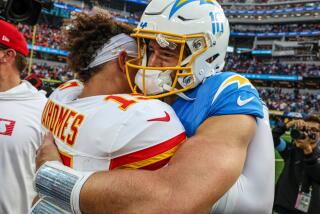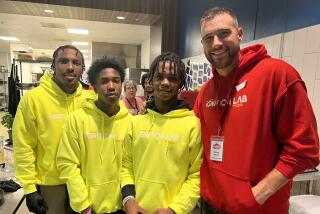A LOOK AT TWO OF SUNDAY’S RAM, RAIDER OPPONENTS : KANSAS CITY’S BRAD BUDDE : Ex-USC Star Has Learned to Lose Where Father Won
This, a skeptical Brad Budde was quickly assured, was not going to be another of those stories about how he has followed in his famous father’s cleat marks to become an offensive lineman for the Kansas City Chiefs.
Honest, Brad, there will hardly be a mention of this being the only time in pro football history that a father and son were drafted in the first round by the same team--decades apart, of course. There might not even be space to reminisce about how Brad used to be a team water boy when his dad, Ed, played in the 1960s and ‘70s, the Chiefs’ glory days.
“The father-and-son thing still is all I ever read about me, and I’ve learned to go along with it,” said Budde, somewhat exasperated. “But there’s a point in time when you get tired of those articles. I mean, I’m in my seventh year now. Talk about something else.”
This time around, Budde has a lot to talk about, and it doesn’t require cracking open the family album.
Budde, former All-American guard at USC, was one of the chief Chiefs involved in the fight when his team played the Raiders Oct. 5 at Kansas City. That fracas resulted in a one-game suspension for Raider defensive end Greg Townsend.
With the rematch looming Sunday at the Coliseum, Budde was asked for his thoughts on the rumble.
“This is the way I look at it,” he said. “It’s a violent game. And any player in the NFL gets off on making hits and being tough, and no one ever wants to be embarrassed. So, the fisticuffs, the shoving, the extra stuff that goes on, that’s all part of the game.
“But when you cross the line of trying to, intentionally or not, inflict severe bodily harm, like when somebody’s lying down and you strike them in the back, or pick them up and throw them down after a whistle, you’ve gone too far. You’re talking about someone’s livelihood out there. That’s where you draw the line. Enough’s enough.”
What exactly happened in the melee late in the first half of the Raiders’ 24-17 win at Kansas City differs, depending on which side is doing the explaining.
It began when the Chiefs executed a swing pass and Townsend pursued the play. Budde, the pulling guard, was on the ground, and Townsend either accidentally tripped over Budde (as Townsend says) or kicked him (as Budde says). Budde got to his feet and started swinging at Townsend, and then other players in the vicinity joined the scrap in hockey-brawl fashion.
Townsend claims that Mark Adickes, the Chiefs’ center, then hit him from behind while Budde hit him from the front. Townsend then tore Adickes’ helmet off as the brawl reached its peak.
The casualty report included Adickes, who had a twisted neck; Budde, who suffered a broken nose courtesy of Howie Long, and Townsend, who later suffered a severe dent in his wallet. Townsend’s suspension cost him about $7,800, and Long was fined $2,000 for breaking Budde’s nose. All told, nine Raiders were fined a total of $13,200.
Budde said the National Football League was justified in collecting fines.
“This is a game of passion, and you have 22 egomaniacs out there not wanting to show their weakness, but what they did crossed the line and went too far,” Budde said.
The 6-foot 4-inch, 271-pound Budde says he wouldn’t be surprised if there were skirmishes when the Raiders and Chiefs, both 8-6, meet again. “That’s the way the Chiefs and Raiders always have played,” he said.
Because his father was a Chief, Budde probably has followed the rivalry closer than most. He has seen the Kansas City franchise at its best, such as when the Chiefs beat Minnesota in the 1970 Super Bowl with Ed Budde at starting guard, and at its worst, such as last season, which ended with a 6-10 record.
But Budde, 27, does little to defuse speculation that he wants out of Kansas City after this season. Although he won’t say that he will definitely seek a trade, Budde admits that he probably would be happier elsewhere. And the way the Chiefs have been filtering in younger linemen, Budde thinks the feeling may be mutual.
“I really don’t know what the future holds for me as a Chief,” he said. “I might not even be here next season. They are starting to shuffle people around on the line. I think everybody who plays wants to be appreciated. Maybe it’s time for me to move on.”
Perhaps one reason Budde doesn’t like to talk about “the father-son thing” is that his career hasn’t turned out quite as well as his dad’s. In his first six years in Kansas City, the Chiefs had a 40-49 record.
If the Chiefs win their two remaining games, they will finish at 10-6, the club’s best record during Budde’s tenure. Kansas City hasn’t made the playoffs since 1971.
In Budde’s view, Kansas City fans have partly blamed him for the Chiefs’ inability to win. After all, he is Ed’s kid. And Ed played on only three losing teams in 13 seasons.
“Coming to the Chiefs was a unique situation for me, but I don’t think it has helped my career much,” Budde said. “I’ve never set the world on fire, but I think I am a good player over the seven years here. You just have to stay positive and try to do your job.”
Budde had hoped for more out of his pro career. At USC, he played in three Rose Bowl games and was the 1980 Lombardi Trophy winner as college football’s top lineman. Among his teammates in the Trojan line were Anthony Munoz, now with the Cincinnati Bengals, Marvin Powell of the New York Jets, Keith Van Horne of the Chicago Bears and Roy Foster of the Miami Dolphins.
But although Munoz, Powell and Foster have been named to All-Pro teams, and Van Horne helped win a Super Bowl last season with the Bears, Budde has toiled in near anonymity in Kansas City. He has played on only one winning team, in 1981 when Kansas City finished at 9-7.
Part of Budde’s problem was the Chiefs, but he also had to adapt to pro competition and different styles of play.
“At USC, all we did was run the ball,” Budde said. “Then, I come to the Chiefs, and all we do is throw the ball. That was a whole different philosophy than what I’m used to, as opposed to the physical, wear-’em-down style we had at SC.
“One of the best things I did was pulling, but we don’t do that much here, either. It took me awhile, but now I’m doing real well. It usually takes awhile for any college lineman to adjust. Anthony Munoz was one of the few exceptions I can remember.”
By far the biggest transition, however, was dealing with losing. Budde is working toward a master’s degree in sports psychology in the off-seasons, and he talks as if he’s already practiced on himself.
“I used to think everybody was a born winner,” he said. “Now, I think we’re all kind of conditioned rats, shaped by our environment. And when you don’t win a lot, it tends not to be the greatest environment to play in. Everything tends to be negative. I didn’t understand the environment when I first came here.
“Your emphasis has to be on positive reinforcement, which is easier when you’re winning. If you don’t, it tends to be what is the problem. They think, ‘Let’s make changes, get the veterans out of here, keep turning over.’
“Then, you look at a team like the Raiders. They’ve got a corps of veterans, and they keep being good to them and integrate younger players when needed.
“The top priority for a player is enjoying what you’re doing. Over the course of the year, to be honest with you, it’s not always fun. You’re losing and the environment is a losing one. After five, six, seven years, it tends to grow on you. I battle that yearly.”
Since most offensive linemen don’t last much into their 30s, Budde already has been planning for a second career, sort of as a shrink to the NFL stars--and linemen, too.
“People are always wondering why (pro athletes) can’t adjust (after retirement), but I don’t see anyone doing anything about it,” Budde said. “I see a real need, not only in the stress management end of the game but in the career placement.”
In the immediate future, though, Budde probably will be trying to move his football career to a different city. Or, as he would say, a winning environment.
“For as long as I’ll be on the Chiefs, they’ll look at my father and me in different roles,” Budde said. “Because he won, Ed Budde was great. Brad Budde? Who’s he, anyway? You know how it is with the father-and-son thing.”
It must be tough, Brad. But the deal was not to talk about any of that.
More to Read
Go beyond the scoreboard
Get the latest on L.A.'s teams in the daily Sports Report newsletter.
You may occasionally receive promotional content from the Los Angeles Times.










